MAGIC at RIT: Engineering the 'Happy Accident'
A Q&A with Andy Phelps
What happens when you mix a high-end technology sandbox loaded with ample, cutting-edge digital media tools and production facilities with some of the world's brightest students and most innovative faculty? Andrew Phelps, founder and director of the Rochester Institute of Technology's Center for Media, Arts, Games, Interaction and Creativity (MAGIC) and MAGIC Spell Studios talks with CT about MAGIC at RIT.
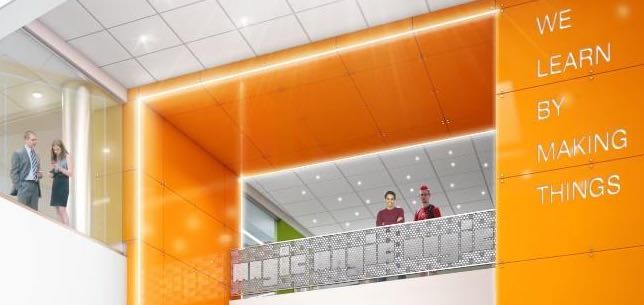
Mary Grush: Why did you start MAGIC Spell Studios at RIT, and what does it do?
Andy Phelps: In my prior academic days, I was the founder and director of RIT's games school, the School of Interactive Games and Media. We were doing a lot of things in games, and in what we termed 'new media' — which is sort of the fusion of design thinking with technology.
One intriguing thing about that work was that increasingly, none of the faculty were necessarily in the right homes. We had a games program that grew in a college of computing; we had a new media program that was trying hard to straddle a college of computing and a college of imaging arts and sciences (which is our art school); we had folks running over to the college of business to try to take entrepreneurship and digital marketing courses; and we had a 'digital humanities' effort coming out of liberal arts.
RIT had what amounted to a kind of hodgepodge across campus in trying to make all this work. So, if you take for example something like games — which was my area — and looked at what you would need to facilitate that kind of work, you'd see that it spreads broadly across a campus in ways that the traditional academic management model isn't necessarily set up to address. And everybody says 'multidisciplinary', but very few actually do 'multidisciplinary' very well.
I had a number of talks with the president, with the provost, and with others on campus, and we came to this idea of trying to move the research and development function a little bit away from being placed simply at the department level. Instead, we were going to create a center that cut sideways through all of the things that were happening at the university. Then, we would seed it with resources so that people had some incentive to play. It's not an uncommon model — it's been done in different places — but we looked at it and said: "We're creating the center, providing the space, and we're using some campus resources to get people engaged and crossing multidisciplinary lines."
Hopefully, we thought, people were going to be able to make things — but the question became: What happens to what they make? And that's where MAGIC Spell Studios was really conceived. If we are serious about facilitating faculty and student work in digital media, a big part of the digital media ecosystem is actually publishing it — getting it out there; putting it in front of the public; and having the public react to it (seeing what that looks like, understanding it, and incorporating what you learn into the next thing that you do).
We looked at our university, and found that it was really not set up to do all that. We had students publishing things into the app stores and then walking away from them. We had multiple groups of people trying to figure out how they were going to do dissemination as defined in their research — but that usually meant writing and publishing a paper or a book about the work, usually without ever publishing the thing itself that they had created, at least not broadly.
We decided we want to get our work 'out there'. In order to do that, we needed a publishing studio. Usually people will just casually say, maybe over lunch, "We'll publish it this week." But really, publishing and and supporting a digital media work is a very involved thing, including dealing with the finances, branding, marketing, and first- and third-party relations… All of this really means you need a place, a center that's committed to publishing and helping others publish their work, servicing the work once it's out there, and helping people understand its impact.
So, that's really what MAGIC Spell Studios does. And it's first and foremost a really different take on what most universities term 'technology transfer' or 'commercialization'.
Grush: So when was MAGIC Spell Studios first operational? And when do you expect to see it living in the new home you are building for it?
Phelps: It started in 2013 — that's when we created the MAGIC Center, and right away, a part of that center was MAGIC Spell Studios. We created MAGIC Spell Studios as a small company within our research center specifically for all of the purposes that I just outlined.
The new building that we're establishing — recently given an official groundbreaking ceremony November 15, 2016 — will be online in the fall of 2018. The building is just now moving beyond the planning stages.
So, while MAGIC Spell Studios has been around since 2013, it is becoming more and more active all the time.
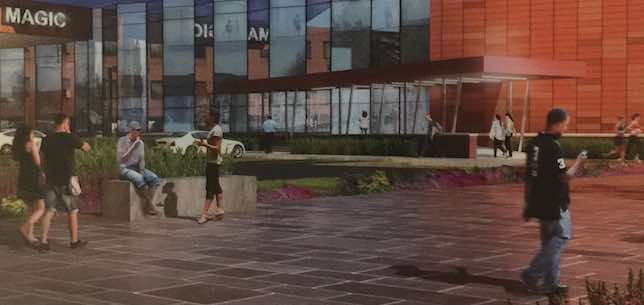
Grush: How do partnerships with companies fit into this mix as you develop, support, and build on the work of MAGIC Spell Studios?
Phelps: I think these partnerships come into play at several different levels and in several different stages, but I can identify four main areas: (1) technology, facilities, and infrastructure issues; (2) publication issues; (3) research relationships; and (4) student internships and learning experiences.
Technology, facilities, and infrastructure issues: Obviously the things that we are doing are tech-centric, and so that means working with a wide array of technology solutions providers, both hardware and software. For example, we are working with Cisco and with Dell in the design of the new facility and equipment. So that's one level, where we partner with companies to provide the tools and resources we need to facilitate this kind of work.
Publication issues: Beyond technology and infrastructure, we are working with companies on publication issues. For example, recently we were one of the first universities to publish an Xbox game, which our students had started in a class. And, in doing that, it meant working with Microsoft and with several different vendors (e.g., Unity) inside Microsoft around the publication process. This involvement is more in-depth than just taking a game engine off the shelf and using it in a course.
Research relationships: Another way we work with companies is through research. For example, we did a project not too long ago with the Experience Design (XD) group at Adobe, where they sponsored one of our groups to think about some of their research questions. They gave us some problems that were interesting to them, and we used what we know about digital media and new media and interaction to think through those questions. We gave them back a series of prototypes — great projects for our students to engage in hands-on, and nice for them to include as portfolio pieces. But also, we provided some real strategic value back to Adobe's own research group in terms of reinforcing their thinking in some cases, or challenging their thinking in certain other instances. A couple of ideas we came up with were 'off the wall' enough to cause Adobe to do some important re-thinking.
Student internships and learning experiences: And finally, another way we relate to companies is through experiences we can offer as a northeastern cooperative education university. For example, our students can take a 4-year degree, split it over 5 years, and with the additional time, go out and work in industry. That directly helps our students get job experience and currency, along with lots of other wonderful educational goals, but it also brings industry experience back to us. There's a constant currency in what we're doing: We send students out to all the major places, and they ultimately come back here with new skills and ideas.
Grush: What about the notion of regional economic development? Are there opportunities for MAGIC Spell Studios to work with the state?
Phelps: Yes, the State of New York helped fund the construction of our forthcoming facility, for which we are very grateful. And they also recognized and invested in RIT, through something called the Digital Gaming Hub — RIT is one of only three universities in the state with that designation, and there is some funding attached to that.
But really, the core notion of the economic development angle is this: RIT for a long time has been very good at graduating students who acquired digital media skills and went to work in industry. In the past, that industry was largely on the west coast or in what I would term the Seattle to Los Angeles corridor. But now, we are starting to see students who, instead of just wanting to go to work for big industry, are increasingly driven to start their own local companies — to establish a startup, to create a small studio, and to consider some work-life choices that are very different than we saw even 5 years ago. A big part of all that is, you can do it anywhere. You don't have to be in downtown San Francisco to have a digital media startup. There were some successful startups here in the not-too-distant past, and we've since heard other students asking, "How can I do that? How can I follow their path?"
We looked at what we were doing with publication and commercialization at MAGIC Spell Studios, and we saw that, in addition to all the other things it's doing, it is creating a learning opportunity for someone who wants to form their own company. They can experience our studio and look at how it works, what the culture is, what resources are needed to create a startup, and what it takes to create a first- or second-gen product and get it out the door. We can use the experience of MAGIC Spell Studios as a tool to help more students start businesses in this vertical, and do that locally, right here.
So there is this little ecosystem now, including MAGIC Spell Studios, RIT's entrepreneurship center, RIT's business incubator, and the downtown innovation zone — all of these things are starting to come together to produce great new talent. We often see work that is unique and interesting, and has commercial potential. We can help get these students set up, get their legs under them, get them some of the starting capital they need, and put them in front of investors. In doing so, we encourage them to grow that business right here at home.
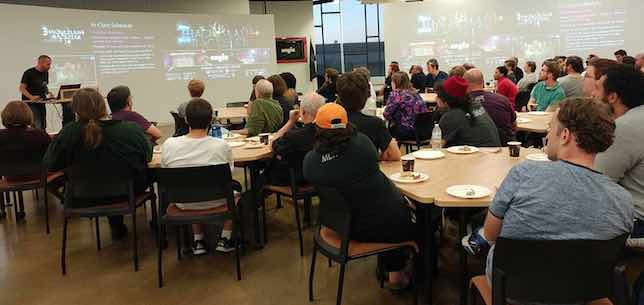
Grush: And from the point of view of RIT (along with the state's interest in regional development), are there other particular incentives or some kind of provision that would get your graduates to stay in Rochester, keep a relationship with you, and bring back as alumni what they have learned in ways that would benefit the center and thereby current students?
Phelps: There are all kinds of additional incentives, both formal and informal. Formally there are some benefits to staying in New York — small business incentives like Start-Up NY — that are kind of generic drivers for why you would want to do this. But more in relation to us at the university, we can show entrepreneurs that a great benefit to being situated near RIT is the perpetual base of really smart people to draw on — especially including those at the center who are all required to co-op. The successful startups that we've seen locally — Darkwind Media, or Workinman Interactive, or Second Avenue Software — all make strategic use of the fact that they can go and get really talented RIT people while they are still in school, and kind of try them out for a year as the company scales up. These companies have a sea of talent to choose from. It's a strategic win for them.
We've worked with some of our startups to get them really good deals on space and infrastructure, and the new facility is going to provide some areas for incubation space even before a startup is ready to leave campus. We've also now seen our first cases where the RIT venture fund is investing in some of these companies directly because they think that there is some real potential there. So, there are lots of ways that both New York and RIT are good drivers for all of this.
But as I look at all the advantages here, I think really the best one is the culture of Rochester. It is an arts town and a tech town, from the beginning. As the home of Kodak, which was using technology to create art, Rochester has that creativity in its DNA. Obviously, things are very different now than they were 20-plus years ago, but I think that culture of being a creative place is still strong. There are 17 different universities in the greater Rochester area — talk about a talent well that's right here. So I think that to the degree that RIT can line up those resources and make them available for new entrepreneurs, I think there are some real wins to be had.
Grush: How do you handle rights management, given that you have students developing their works within your center at RIT?
Phelps: RIT has a very progressive policy regarding IT works in general: If a student makes it, the student owns it. (An exception to that would be if we are paying the student to create the work as an employee, then RIT owns it.)
Now, when you interject something like MAGIC Spell Studios, this picture gets a bit more complicated. Typically, what we try to do at MAGIC Spell Studios, is to hold the rights for whatever we are publishing with the studio, because that is the entity responsible for publishing and maintaining the work. However, we will usually grant back rights to use to the inventor/creator. And depending on specifically what the work is, we may be paying royalties or paying something up front. But every project is like a snowflake, so there is no one-size-fits-all.
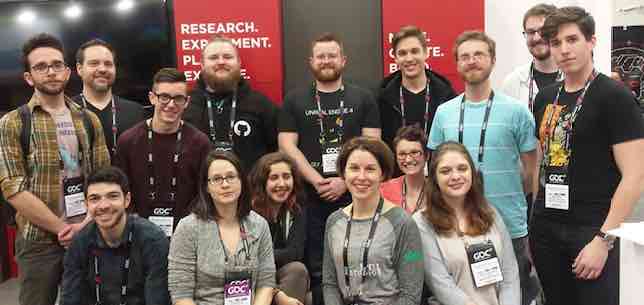
There are lots of ways that we work with students and faculty, with the idea of giving them every advantage. The university is not out to capitalize in the short term — this is a long game. We think the real wins are if we help students step out and found studios, or if we help faculty start interesting new products, and so forth. In the long run, we win, because these are our employees and our alumni who can give back to the university. RIT prefers to help a student, protect a student, help them get their work out there, and have a relationship with them for years to come.
Grush: What about this notion of "Geek Heaven"? What are you creating in terms of resources for the MAGIC Center?
Phelps: To understand "Geek Heaven", you need to consider a couple of things. Typically in most academic environments, someone's research project will fund a traditional lab around a really specific set of goals and objectives based on the project that funded it. And, the only people using the lab will be the people directly associated with the project and affiliated with that lab. Okay, that usually works in terms of further support of the research agenda of the faculty member or support of those given projects.
But, we stood all that on its head a bit and said, "With some things that are emerging, we just don't know exactly where they are going to go." Digital media keeps reinventing what's possible every couple of years. So for us, the really interesting things are the interconnections — the ways that different fields are, if you will, kind of tripping over themselves and each other.
So we had this notion of Geek Heaven, which was not at all like the traditional lab I described. We try to get everything that we can — everything cutting edge — and put it all in the same place. The only rule in terms of use is that you are not allowed to tell somebody else that they can't use it. The whole point, then, is to create a sort of shared sandbox and invite everybody to come and play with the very best toys. Then you stand back and watch the things that emerge. You have all of these groups, together, with resources like a sound stage, a movie theater, a VR lab, games labs, animation classrooms, incubation space, collaborative partner spaces, and more — all of this, wrapped up in this one facility.
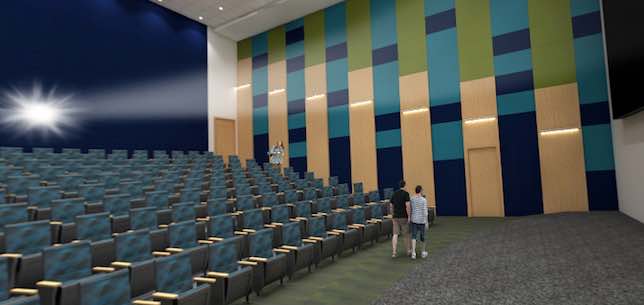
The core driver of all of this, is that it's all in the same spot. So Geek Heaven is Christmas morning with all the technology and all the toys. But we then say, in effect, "Open up all the presents, throw them all over the room, but then let's see what happens when people start playing in this type of environment and near each other." We are trying to engineer the 'happy accident'.
Grush: Do you have to do anything to make sure that all students realize that they "belong" in the lab — So that the facility is not just serving a smaller proportion of students?
Phelps: We don't need to do much! RIT students are interesting — and I've heard this from students and parents alike — in that they come to us having mastered a very specific game: They've "won" high school. These are folks who looked at high school as a system, and they optimized for, and beat, that system. They were able to get all the good grades and the academic standing they needed. And they did stand out and distinguish themselves among their high school peers. So in their high schools they were "different".
But they come here, and almost immediately, it's like they've found their tribe. They've found other people who share many of their interests, and are creative like they are — there is a sudden sense of belonging, which some of them had never really felt before.
So, all we really have to do in regards to the center is to say, "You belong." Before you know it, they are trying out everything they can get their hands on. All you really have to do to engage our students with a facility like that is to give them a first experience. Crack the door open. These people will come thundering through.
The next biggest thing that we do in regards to use of the center is to publish the works that we make with students. That's good in itself, but in addition, we really highlight these works back to our own campus. In doing that, we are showing other RIT students that we have students they can talk to who may have done something similar to what they would like to do.
With some students coming from highly structured high schools, there may be some initial trepidation about what the process is. In truth, the only "process" is to "sit down and start making stuff". Many of these students came from environments where there were a lot of rules. We just have to get them over that hurdle to understand that "There are no rules — do what you came here to do."
Grush: I know you could speak volumes about impacts and trends related to digital media. But when you think about the work that these students are doing, what comes to mind as an impact you might want to highlight here?
Phelps: There's a ton wrapped up in that question, particularly at this moment in America. There's an awareness of the way in which digital media and communications is impacting who we are, how we think about ourselves, our roles in society, and our roles in the world — these are things that we are talking more and more about now.
For some time in the past, many engineers wanted to see themselves as "just building stuff" and not responsible for what was built in terms of its consequences. It's never been really true, of course, that you can actually do that — there are always consequences. But there was this little moment in the digital media bubble where I think that many engineers thought there was an easy way out — "just build stuff". Then take the easy door out.
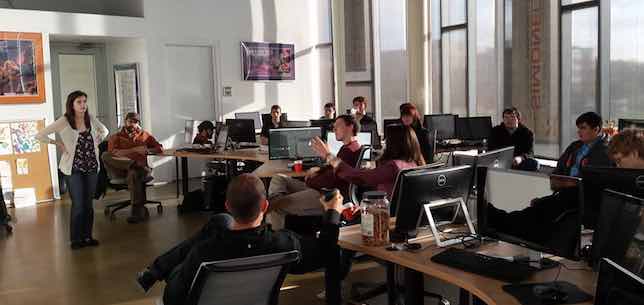
I don't think we ever did take the easy door at RIT, and I know for sure that we should not. Programs like the MAGIC Center and MAGIC Spell Studios ground students and faculty in currency, and there is a responsibility that comes with that currency. You know how digital media works, you know what's happening with it, and you are exploring its use at the very forefront of what's possible. But that also means that you have to consider the implications of what's possible. And because these programs are experiential, they actually force you to do that. You can't just publish your work in this context and put it out in the world and not be responsible for its impact.
We are trying to challenge, in some ways, what the role is for our work. We hope that the games and media experiences we publish out of the studio will operate at more than one level. The first level may be as an entertainment product, an experience that draws someone in and is functional and aesthetically well-done; another level is as a gateway to exploring some themes that are not typically explored or are under-explored in the ways that we typically think about these experiences. For example, a game we made called Hack, Slash & Backstab was on the one hand a party game you play with your friends, and on the other a parody of workplace politics and evaluation metrics.
We find ourselves now in a world where the technology has vastly eclipsed our understanding of its impact and its role. We are, in a way, playing "catch-up" in understanding what it is doing to us.
Grush: Why, do you think, are you having such success with the MAGIC Center and MAGIC Spell Studios?
Phelps: The reason that MAGIC is working, from my perspective, is that it has very few rules. We were very fortunate that our program was established by the university president — that garners you a certain level of ability to club the rules away.
But in another sense, we are in a somewhat odd political position relative to the university, because our work does cut sideways against the normal structure of how programs are thought to operate.
This also means that there is a certain amount of organizational friction. It's the kind of thing where we will regularly encounter sentiments like, "Well, that's just not how we do things here". It seems that if the university has a set way of doing things, we are usually the first unit to step outside of that box. This may be because we are working towards a goal that was never achieved or even envisioned before. And our work is important enough that our mindset is that we simply must challenge old assumptions. Happily, university leadership has been comfortable with that. It is just part of our environment. There is a lot of background noise to our operation, and the only way that we can be successful is to be comfortable with that background noise.
I've been quoted as saying, that when we came up with the name MAGIC — the Center for Media, Arts, Games, Interaction, and Creativity, we could just as easily have said that the M stands for "Messy". You have to be comfortable with the idea that every project is unique and involves a degree of uncertainty and risk. We have to remind ourselves continually of all this and reaffirm our commitment to our work.
MAGIC is designated specifically an innovation unit, set up for the purpose of doing things for the first time and challenging assumptions. Hopefully, as we do more and more things, some of those that have value will be institutionalized and become part of the operational fabric of the university.
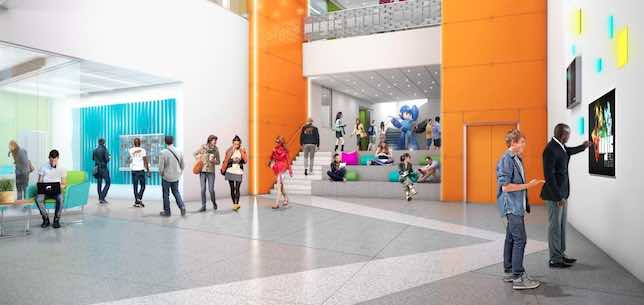
[Editor's note: All images courtesy of the Rochester Institute of Technology, including both current photos and computer renderings of the forthcoming MAGIC facility.]
About the Author
Mary Grush is Editor and Conference Program Director, Campus Technology.